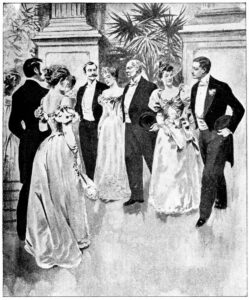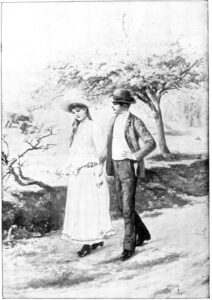by James Scott Bell
@jamesscottbell
 I love rooting around in Project Gutenberg. This amazing site has been digitizing public domain works since 1971! But wait, there was no internet then, so what gives? A visionary, that’s what. A 24-year-old grad student named Michael Hart at the University of Illinois foresaw the coming of a network of computers sharing knowledge. Gaining access to a university mainframe, he started adding digitized literary works in the public domain.
I love rooting around in Project Gutenberg. This amazing site has been digitizing public domain works since 1971! But wait, there was no internet then, so what gives? A visionary, that’s what. A 24-year-old grad student named Michael Hart at the University of Illinois foresaw the coming of a network of computers sharing knowledge. Gaining access to a university mainframe, he started adding digitized literary works in the public domain.
Thus, Hart was the inventor of the ebook. Really.
He spent the rest of his life (he died in 2011) dedicated to his project, which he called Gutenberg. And how did the books get digitized and uploaded? They were hand typed! By Hart himself and a team of volunteers. This work went on for 25 years until the coming of scanning technology. Since that time Gutenberg’s growth has exploded. It now has over 66,000 works in its collection available for free download on any reading device. Among works that have just come into public domain are Winnie-the-Pooh and The Sun Also Rises.
And not just books. Gutenberg is adding pulp magazine stories from the golden age, e.g., science fiction, detective. Also some audiobook versions. I have dozens of Gutenberg books on my Kindle.
I get their daily update and always find some interesting titles to have a look at. The other day it was Modern Essays and Stories: A Book to Awaken Appreciation of Modern Prose, and to Develop Ability and Originality in Writing by Frederick Houk Law, Ph.D., published in 1922.
Dipping inside, I came across the entry on what makes a good short story.
Brevity is the first essential of a short story, and yet under the term, “brief,” may be included a story that is told in one or two paragraphs, and a story that is told in many pages. A story that is so long that it cannot be read easily at a single sitting is not a short story.
That’s a good definition, as it includes what we now call flash fiction, and draws the line before crossing over into the novelette and novella range.
So what does a good short story do?
To make one strong impression on the mind of the reader, and to make that impression so powerfully that it will leave the reader pleased, convinced and emotionally moved is the principal aim of a good short story. To the production of that one effect everything in the story—characters, action, description, and exposition—points with the definiteness of an established purpose. All else is omitted, and thus all the parts of the story are both necessary and harmonious. Centralizing everything on the production of one effect makes every short story complete in itself. The purpose having been accomplished there is nothing more to be said. The end is the end.
Well now! If I may modestly mention my own book on the subject, How to Write Short Stories and Use Them to Further Your Writing Career, this affirms the “secret” I found by analyzing thousands of short stories. I call it “one shattering moment.”
What that moment is depends on the type of story you write. If it’s a crime or mystery story with a “twist,” that’s one kind of moment, and usually comes at the end (see Elaine’s post on that subject here).
Another type of story is the one that lays you flat with an emotional punch. Here the shattering moment may happen in the middle, as it often does in a Raymond Carver story. The emotional shattering can come at the end, as in Irwin Shaw’s classic “The Girls in Their Summer Dresses.”
Keeping one shattering moment in mind gives you all the direction you’ll need to write a short story worth reading. Just add your own stamp and creativity.
A good short story can be a gateway for readers to discover you and your full-length books. So where can you publish? There are established venues, like Alfred Hitchcock and Analog. These can be hard to crack and take a long time to hear from.
Some authors, like yours truly, use Patreon. (Hey, can I urge you to give it a try? No obligation, and I’d love to hear what you think!)
Many more use sites like Wattpad, Medium, and Comaful. Heck, you can start your own blog just for short stories.
Or why not go right to Kindle? Publish it in Kindle Select, price it at 99¢, and run a free promo every 90 days. Make sure you have links to your website and books in the back matter.
And if you can find a real bookstore with a window, you can sit there and type a story on the spot, like Harlan Ellison used to do. Ha!
Short stories and flash fiction are good ways to keep your creative muscles juiced, and offer a nice respite from full-length fiction. And if you can give readers that shattering moment, they’ll come looking for your other work!
***
BONUS: For you craft fans, I’m participating in a great StoryBundle of writing books. Check out how you can get them all at Write for the Win.


